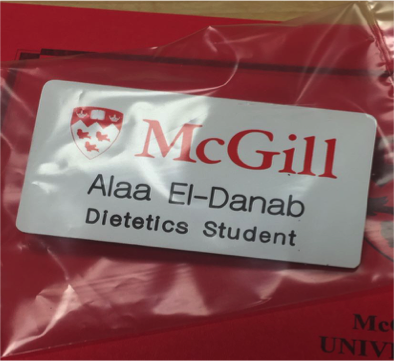My Reflection about McGill’s Master’s of Science Applied in Human Nutrition- Dietetics Credentialing

By Alaa El-Danab, MSc., RD | April 20, 2018
It was around two and a half years ago, when the exhilaration stemming from my undergraduate commencement began to fade, that the questions that plague most graduates surfaced. What’s next? Did I want to pursue a master’s degree? Did I want to go straight into an internship? Personally, I still had a lot of growing to do and did not feel ready to jump right into an internship. And more importantly, I knew that I wanted to learn more and delve deeper into the science of human nutrition. I guess that answers my question, right? I went digging into all the programs that offered a combined master’s degree with a practicum component. As a nutrition graduate from Ontario, I had little knowledge of other Canadian programs that were offered. I’ve always enjoyed the scientific and clinical aspect of nutrition; I knew I wanted a program that catered to my interests. After some research, I decided on McGill’s
Master’s of Science Applied in Human Nutrition-Dietetics Credentialing.
You might be wondering, “How does this program work”? Well, let me break it down for you!
Program Overview
The Master’s of Science Applied in Human Nutrition-Dietetics Credentialing is an 83 credit program that is open to students with a bachelor’s in the field of nutrition and other related fields. Unlike other programs that require a background in nutrition before becoming a dietitian, McGill provides a way for students to complete a “qualifying year” before completing the required master’s courses, followed by the internship. To be eligible for the program, students must achieve a minimum of a 3.5 CGPA in their undergraduate degree, and maintain this mark throughout the program. After successful completion of the program, students are eligible to register with their provincial regulatory body and practice as a dietitian. McGill’s program usually takes about two and a half to three years to complete. I always knew that I wanted to complete my master’s degree, so the length was not a deterrent to me, especially as I was able to fill two needs with one deed—Master’s Degree and RD credentials.
The program includes three semesters of course work, followed by a 10-month internship that provides experience in clinical practice, foodservice management, and community nutrition or public health. Similar to many programs, there is also an applied research project embedded into the program that can be completed before, during, or after the internship.
A unique aspect that caught my eye about the program was the opportunity to complete a portion of the internship internationally. Placements include the Caribbean (Barbados, Dominican and Granada), Africa (Ghana), and Northern Ontario and Québec (James Bay, Nunavut, Whitehorse, and Iqaluit). Not only would you get to experience a new culture, but as an emerging dietitian, this irreplaceable experience would provide skills highly valuable to your future career. Although I did not seek this opportunity, many of my colleagues spoke highly of their experiences, allowing them to expand their knowledge, skills, and networks by contributing to community initiatives.
The course work includes theoretical based classes (clinical nutrition, research, statistics, and bioenergetics) to application-based workshops (seminars, presentations, counselling and interviewing skills). It’s jammed packed but that’s the beauty of it. As a student, I had the pleasure of being a part of one of Canada’s leading institutions in the field of Human Nutrition. Most importantly, the program offered me the flexibility to take various courses that were specifically tailored to my career goals. I’m passionate about clinical nutrition, research, and education and eventually see myself going into teaching.
As dietetic students, one of the most challenging aspects to future practice is applying theoretical knowledge to real-life situations. At McGill, I was able to practice at the Steinburg Center for Simulation and Interactive Learning, which provides healthcare students with the opportunity to experience hands-on learning in difficult situations without harming others. It works by using “real life” actors in clinical, community, and/or food service scenarios. This provides students with the ability to receive real-time feedback and learn from their mistakes. Sounds interesting, right? It is!
I wish I could share all the stories that made my learning experience worthwhile. But in the interest of time, below are just a few of the highlights to help you get a feel for the program.
Highlights
Research: With the hopes of getting my research published, my group and I travelled to Northern Ontario for our professional dietetic project,
Impact of Site Work on Eating Habits and Perceived Nutritional Health. In collaboration with Sodexo, the goal of the research was to examine the effects of an on-site/off-site work schedule on eating habits and perceived nutritional health at a Northern Ontario mining site. My group members and I spent 14 days in Rainy River collecting data. During our time there we got to experience the culture and visit a First Nations Reserve, including watching a Powwow. Although at this point in my career I do not see a PhD in the works, this opportunity allowed me to gain a new interest in research. Stay tuned for more information about our project!
Internship Placements: Although I enjoyed all my placements, my most memorable were my clinical rotations, reinforcing that clinical practice is the place for me. My placements included cardiology/cardio intensive care, nephrology, and GI surgery. In addition to rotations, I enjoyed participating in education sessions and conferences offered by allied health professionals. Some examples include: The 4
th Annual PERFORM Centre Research Conference- Physical Activity & Aging: Multidisciplinary Actions, and The Annual Symposium of Dairy Farmers of Canada. From basic nutrition education to more complex care, I learned an exceptional amount. I thank all my incredible preceptors who mentored me throughout each practicum.
Teaching—I worked as a teaching assistant for a variety of classes such as
Research in Nursing for the Faculty of Medicine,
Food Service Management for the Faculty of Human Nutrition, and the
Science of Foodfor the Faculty of Agriculture and Environmental Sciences. From preparing course material to grading, I was able to strengthen my communication and delivery skills. Working with students provided me with a sense of happiness and purpose. Teaching is something that I would love to continue to do in the future.
Improving my French—Believe me when I say, my French was subpar before my move to Montreal. I was hesitant to take my acceptance offer due to the language barrier so I made it a goal to take classes and do the best I could. The summer before the start of my internship, I took a 6-week intensive French class at McGill. I must say, having spent my summer in Montreal and being around the culture and language every day, I was able to learn the language faster than I had thought I would. I also watched French TV and read as much as I could. Moreover, my friends were very supportive and helped me throughout the process. Although I did encounter some French speaking individuals throughout my internships, my preceptors were aware of my limitations with the language. I never felt that my language barrier hindered my ability to learn. For the most part, individuals are bilingual and will appreciate your efforts. Although I am slow to speak and understand, I am proud to say that I gained a third language.
McGill offered me a lot more than I ever expected. If you’re like me, and are eager in experiencing something new, I highly recommend this program for you.
My Advice
I urge everyone to take the time to truly think about the reason(s) why you are choosing a program or internship. What do you hope to gain? Is it in line with what your goals? It’s important to take the time to reflect on your wishes and dreams.
Tips for the application process:
- Program requirements: Make a list of all the requirements for each program. It’s never too early to plan; be proactive! Prepare your documents ahead of time. Give yourself lots of time to reduce stress.
- Make a pros and cons list: Evaluate each program’s goals and objectives against your own. If you’re interested in a graduate program, look at the courses offered and read the descriptions to make sure that the classes offered will interest you.
- Location: If re-location is necessary, I would highly recommend visiting the area before hand to make yourself acquainted.
- Cost: Tuition costs of each graduate program/internship vary considerably. Choose a program that is affordable, while still meeting your expectations.
- Ask questions: You may not find all the answers you are looking for online. Ask your questions by contacting the programs that you are interested in. I scheduled an appointment with my program advisor before accepting my offer. I was able to get a feel for the program, meet program advisors, instructors, and current and prospective students.
I wish everyone all the best with their upcoming year!
 Alaa received her BASc. in Nutrition & Food from Ryerson University in 2015. She went on to receive her master’s degree in Human Nutrition from McGill University in December 2017. As a newly licensed dietitian, Alaa is eager to share her experience as a graduate and dietetic student. In addition to her love of food and nutrition, Alaa enjoys fitness, travelling, and catching up on her latest TV series. Connect with Alaa on LinkedIn.
Back to Practice Blog
Alaa received her BASc. in Nutrition & Food from Ryerson University in 2015. She went on to receive her master’s degree in Human Nutrition from McGill University in December 2017. As a newly licensed dietitian, Alaa is eager to share her experience as a graduate and dietetic student. In addition to her love of food and nutrition, Alaa enjoys fitness, travelling, and catching up on her latest TV series. Connect with Alaa on LinkedIn.
Back to Practice Blog